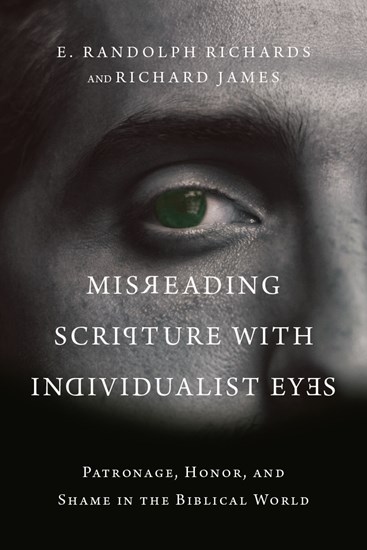Misreading Scripture With Individualist Eyes: Patronage, Honor, and Shame In The Biblical World
 E. Randolph Richards and Richard James, Misreading Scripture With Individualist Eyes: Patronage, Honor, and Shame In The Biblical World (Downers Grove, IL: InterVarsity Press, 2020), 304 pages, ISBN 9780830852758.
E. Randolph Richards and Richard James, Misreading Scripture With Individualist Eyes: Patronage, Honor, and Shame In The Biblical World (Downers Grove, IL: InterVarsity Press, 2020), 304 pages, ISBN 9780830852758.
This is the second “misreading” book that E. Randolph Richards has written. The first one was Misreading Scripture with Western Eyes which he wrote with Brandon J. O’Brien. For this second volume he has teamed up with a different writer, Richard James (this is a pseudonym, it is used for safety reasons because of the part of the world where he works). As the subtitle of the book indicates the authors write about some concepts that were very well-known in the biblical world, but are not as well-known in Western culture. I am referring to: patronage, honor, and shame. They also write about kinship, benefactors and clients, and boundaries. The people of the biblical world understood these concepts and practices. As the authors point out on more than one occasion, these matters of culture did not need to be spelled out, the people of the biblical world understood them and could see them at work in Scripture (page x-xi, 8). However, Western readers do not see them or assume them (page xi). Because of this we may miss them when they are at work in biblical passages. As the authors articulate these concepts they point out the differences that exist between collectivists’ cultures and individualists’ cultures. America and modern Europe are individualist cultures, most African, Eastern, Middle Eastern, and South American cultures are collectivist (page ix). The cultures we find in the Bible were collectivist (page x, 8).
As the book unfolds the authors draw from Scripture and their own experiences. Since they have lived in different cultures they have first-hand examples of the thoughts and practices of people who live in a collectivist cultures. It makes for some interesting reading.
The cultures we find in the Bible were collectivist.

E. Randolph Richards
They offer some other interesting insights as well. For example, they point out the different ideas that people have about the story of Joseph in the Old Testament. People from individualist cultures focus on Joseph’s rise to power. In the face of all kinds of setbacks and obstacles he becomes a prominent person. That grabs our attention. People from collectivist cultures tend to focus more on Joseph’s restoration to his family than his rise to power (page 11).
The differences between individualist and collectivist cultures is further brought out with a contemporary example. A pastor in Beirut was concerned because someone from his church had stolen a book from the church library. He knew who had done it. In the West we would be concerned about getting the book back. This pastor’s concern was not so much about getting the book back as maintaining the good name of the church in the community. He did not want his church members to be known as thieves. He found a way to speak to the thief in a nonthreatening way that helped the man save face, be reconciled to his church community, and maintain the good reputation of the church in the community (pages 174-175, 186).
This book is filled with insights into the biblical texts.
This book is filled with insights into the biblical texts, both in the Old Testament and in the New Testament. Many of these insights could be easily overlooked by Western readers because we are not familiar with the cultural constructs of Eastern, collectivist cultures that the people in the biblical world had. I like books like this. They open a window of understanding into the biblical text that we might not otherwise see. If you are interested in deeper Bible study or the cultural background of the Bible this is a book you will enjoy. One thing we as believers do not want to do is misread Scripture. Instead, we want to correctly interpret it (2 Tim. 2:15). This book will help us do that.
Reviewed by John Lathrop
Publisher’s page: https://www.ivpress.com/misreading-scripture-with-individualist-eyes
Category: Biblical Studies, Spring 2021


